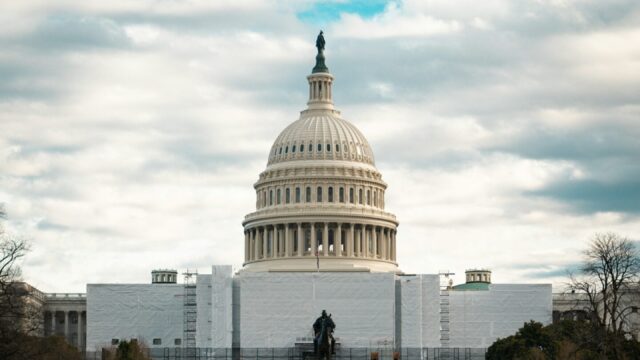Federal agencies urged to crack down on unauthorized e-cigarette products
May 2024

The Big Cities Health Coalition joined more than 75 public health, medical, education, community, and other organizations to urge FDA and other parts of the Administration to use all the enforcement tools at their disposal to clear the market of unauthorized e-cigarette products, including flavored products that put young people at risk for nicotine addiction and other significant health harms.
FDA has authorized only 23 e-cigarette products and has made it clear that “[t]hese are the only e-cigarette products that currently may be lawfully sold in the U.S.” This means that virtually the entire e-cigarette market consists of unauthorized, illegal products, including a wide variety of flavored products (largely disposables) that FDA has found to be highly appealing to youth. This is a wholesale failure to enforce the Family Smoking Prevention and Tobacco Control Act (Tobacco Control Act or TCA) by FDA and other government enforcement agencies. There must be an intensified and coordinated, multi-agency federal effort to enforce the law against these illegal products in an effective and equitable manner.
We urge the adoption of several concrete changes in tobacco enforcement policies and activities to bring this problem under control.
FDA should make more frequent use of the full range of available enforcement tools
Although FDA has issued over 600 warning letters to firms for manufacturing or selling new tobacco products without marketing authorization, it has made sparing use of its stronger enforcement tools with respect to manufacturers, distributors, wholesalers and retailers, including civil monetary penalties (CMPs), no-tobacco-sale orders, product seizures, import restrictions, injunctive actions and criminal prosecutions. For example, as of the present time, FDA has filed CMP complaints against only 55 manufacturers and 108 retailers; injunctions have been sought against only seven manufacturers and there has been a single seizure pursuant to a civil forfeiture complaint. This level of enforcement activity is far from adequate, given the unprecedented scope of illegal e-cigarette sales. Moreover, FDA has admitted that “there is no legal requirement that FDA send a warning letter before the agency can initiate an enforcement action.” Therefore, FDA and other federal enforcement agencies should make greater use of its most potent enforcement tools and should consider taking action without first sending a warning letter in appropriate cases.
FDA must seek greater penalties in CMP actions
With respect to the CMPs it has issued, FDA has been consistently charging companies with only a single violation of the statute and thus has been seeking only the inflation-adjusted maximum penalty for a single violation – now only $20,678 – even where the company may be marketing hundreds or thousands of violative products. This is entirely insufficient to deter future illegal activity.
The Tobacco Control Act gives FDA the explicit authority to charge a company with multiple violations, up to $1.2 million in a single proceeding. While FDA repeatedly claims it is charging the statutory maximum in CMPs, it has never explained why it is not charging multiple violations. FDA has the authority to levy CMPs without the participation of other agencies like DOJ and CBP, but to create real incentives to comply with the law, FDA must be willing to levy more severe penalties.
The Department of Justice must prioritize tobacco product enforcement and the process for bringing actions for injunctive relief must be streamlined
Because FDA does not have its own litigation capability, it must involve the Department of Justice (DOJ) in seeking injunctive relief from courts against the marketing of unauthorized products. Yet injunctions have been sought by DOJ against only seven manufacturers of unauthorized e-cigarettes. Moreover, in the first set of injunctive actions brought against companies selling unauthorized products (filed in October, 2022), between 13 to 18 months passed between the time FDA sent a warning letter to the companies and the commencement of injunction proceedings in court. Similarly, for the most recent injunctive action brought (December 2023), more than 19 months passed between the time FDA first sent the company a warning letter and the commencement of injunction proceedings. During this time, the companies profited from the sale of their illegal products, which included youth-appealing flavors. Therefore, tobacco product enforcement must be a priority for both FDA and DOJ and the agencies must find ways to streamline the process for seeking injunctions against unauthorized products, particularly those that constitute threats to young people.
U.S. Customs and Border Protection (CBP) must prioritize efforts to stop illegal importation of unauthorized products
It is generally recognized that the illegal market has been largely supplied in recent years by the illegal importation of unauthorized products manufactured in China, particularly flavored disposable e-cigarettes that are appealing to youth. Although FDA has stated that it has placed certain e-cigarette companies on its import alert red list, allowing the agency to detain products at the time of entry without a full inspection, FDA and CBP just recently announced the first large-scale seizure of unauthorized products. The detection of unauthorized products must become a joint priority of FDA and CBP and the seizure authority must be more aggressively used, particularly for flavored products that appeal to young people.
Enforcement actions must be brought against all parties in the supply chain
A federal enforcement strategy directed at unauthorized e-cigarette products must include enforcement actions against all parties in the e-cigarette supply chain, including manufacturers, distributors, importers and retailers. To date, FDA’s actions, including warning letters, have mainly been targeted at retailers and manufacturers, with many involving products with minimal market shares. Heightened enforcement actions must also be directed at wholesalers and distributors, particularly those with large-scale operations. As the Reagan-Udall Report noted, “high profile [enforcement] actions against wholesalers and distributors who are handling illegally marketed products … could help clear the downstream distribution pathways of illegal products and deter those who might bring new products to the market without marketing authorization.”
FDA must end the broad exercise of enforcement discretion
FDA has stated that it “has not adopted a broad policy of enforcement discretion regarding tobacco products without marketing authorization” and “[f]or the vast majority of unauthorized e-cigarettes on the market today, the pendency of an application does not create a legal safe harbor to sell that product.” But we know of no case where FDA or the Department of Justice has brought an enforcement action against – or even sent a warning letter to – a company with a pending application, even though such products are no more legal than products for which no application was ever filed. Some of the products proven to be most popular among youth – including JUUL – are still under review at FDA, long after the September, 2021 court-imposed deadline for FDA premarket determinations. As long as their applications are pending at FDA, those products appear to be protected by a de facto agency policy of enforcement discretion. Despite FDA’s assurances that “[t]he decision whether to take enforcement action will be made on a case-by-case basis, taking into account youth use and other risk factors,” that does not appear to be true as to products with pending applications. Certainly as to flavored products with great youth appeal, there should be no across-the-board policy of exercising enforcement discretion.
Conclusion
The continuing deluge of unauthorized e-cigarettes into the U.S. market is undermining FDA’s efforts to ensure that no e-cigarettes are marketed without being reviewed by FDA and found to have met the TCA standard of being “appropriate for the protection of the public health.” Thus, despite the fact that FDA has denied marketing authorization for millions of flavored e-cigarette products, several studies have shown that the number of e-cigarettes on the market has increased, and that these products have gotten larger in volume, stronger in nicotine strength and cheaper to buy. None of these products have been authorized. Meanwhile, the prevalence of youth e-cigarette use remains unacceptably high, with 2.1 million high school and middle school students currently using e-cigarettes. The failure to adequately enforce the law against unauthorized products plainly has real, and significant, public health consequences.
As Commissioner Califf indicated in recent testimony before the House Agriculture, Rural Development, FDA and Related Agencies Appropriations Subcommittee, “we have had significant seizures and injunctions. But nowhere near the number that would stem the tide” of illegal products. We urge FDA, DOJ and CBP to respond with an “all hands on deck” strategy that will use all enforcement tools at their disposal to protect the public health, and particularly the health of our young people, from the flood of illegal, unauthorized e-cigarettes.


